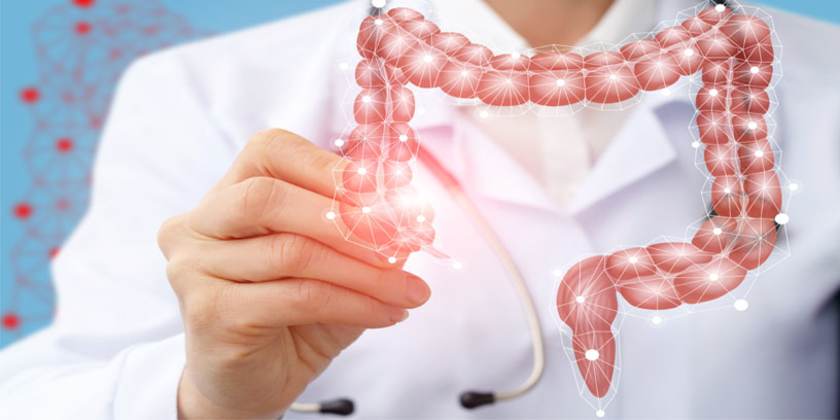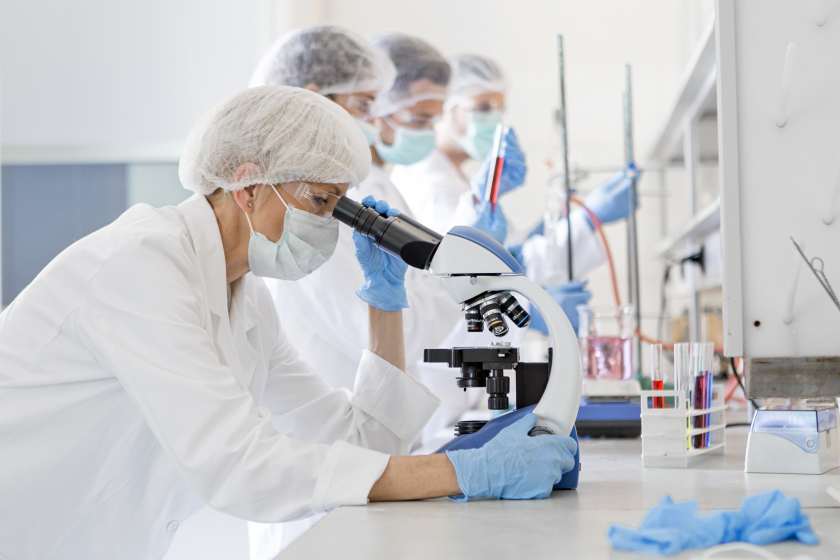Cancer of the small intestine

The development of malignant formations in the area of the small intestine is an infrequent pathology. Diseases occur in 3-4% of all oncological processes occurring in the gastrointestinal tract. Men over 60 years of age are more prone to the problem, in women, the pathology is detected twice as often.
Cancer of the small intestine: risk factors
The exact causes of the appearance and development of cancer in the small intestine are unknown, but it is associated with some chronic diseases of the gastrointestinal tract. Among them, the presence of:
- duodenitis;
- celiac diseases;
- Crohn's disease;
- benign neoplasms of the small intestine;
- hereditary pathologies of the digestive tract;
- enteritis;
- colitis.
Also, the use of foods containing carcinogenic substances, ionizing radiation, and hereditary predisposition to neoplasms are also among the risk factors.
If small bowel cancer is suspected, the symptoms and further treatment will largely depend on the type and neglect of the disease.
Varieties
By location relative to the wall of the small intestine, two types of pathology are distinguished.
- Exophytic - the tumor is located in the lumen of the small intestine. Most often, it looks like a fungus, polyp or plaque with clearly visible contours, can lead to its obturation (clogging).
- Endophytic - the neoplasm is located in the layers of the intestinal wall. Does not have clearly visible contours. As a result, it can lead to the development of bleeding and perforation of the intestine.
Several types are distinguished by histological structure.
- Adenocarcinoma is a tumor consisting of elements of glandular tissue.
- A sarcoma is a collection of neoplasms that develop from so-called "immature" tissue elements. They can be of muscle, fat, connective tissue or vascular origin.
- Lymphoma is a tumor from elements of lymphoid tissue.
- Carcinoid – a neoplasm of regenerated epithelial cells can be diagnosed along the entire length of the intestine.
- Primary melanoma is a tumor that develops from melanocytes - cells that contain the pigment melanin.
- Malignant schwannoglioma is a neoplasm from Schwann cells of nerve fibers.
Stages
According to the TNM classification, there are several stages of small intestine cancer:
- I – spread of the tumor in the submucosa and up to the muscular layer of the wall of the small intestine without its complete germination.
- IIA – tumor growth through all structures of the wall to the surrounding fatty tissue, without touching the surrounding organs. IIB - germination in the inner leaf of the peritoneum. IIC - spread to other bodies and structures.
- III – appearance of metastatic foci in local lymph nodes or contact spread of tumor cells in mesenteric tissues.
- IV – the presence of metastases in one or more organs, the spread of metastatic foci in the peritoneum.

Cancer of the small intestine: signs
At an early stage, it is difficult to suspect cancer of the small intestine, the symptoms of the disease are not specific. It is possible to determine the oncological process only by indirect signs (heartburn, nausea, loss of appetite, pain in the epigastric area or flatulence), which is very difficult.
As the tumor progresses, in addition to the signs listed above, general and specific symptoms appear. The following signs help to suspect a malignant process:
- general weakness of the body, gradually increasing;
- unreasonable decrease in the efficiency of the labor process, rapid fatigue;
- unmotivated lack of appetite;
- weight loss;
- body temperature constantly reaches subfebrile values (up to 38 degrees Celsius);
- anemia that arose against the background of the absence of obvious organic pathology.
Brighter signs of small bowel cancer include:
- increasing pain as the tumor grows;
- blood-stained stools and iron-deficiency anemia as a result of overt or hidden intestinal bleeding;
- obstructing the passage of intestinal contents due to the closure of the lumen of the small intestine by a neoplasm;
- palpatory detection of a tumor;
- signs of damage to other organs due to their growth or metastatic damage (jaundice, burning pain, profuse diarrhea).
Cancer of the small intestine: diagnosis
Laboratory, instrumental, surgical and histological research methods are used to make an accurate and informative diagnosis.
Laboratory includes the following.
- Test for occult blood in feces. In the initial stages, as a rule, there is no obvious bleeding from the intestines. Blood may be present in small amounts, so it can be detected only with the help of an immunochemical test.
- Blood and urine research to determine characteristic tumor markers and antigens.
- Standard laboratory tests: UAC, OAM, VAK, etc.
Instrumental and surgical methods include a number of studies.
- Gastrointestinal examination using endoscopic devices - fibrogastroduodenoscopy, colonoscopy. With their help, you can see the tumor process with your own eyes and take a sample for analysis.
- Images of a computer or magnetic resonance imaging scan reveal neoplasms and show the spread of the metastatic process to determine further tactics of therapy.
- Examination of the organs of the abdominal cavity using an ultrasound machine.
- X-ray examination with contrast of the necessary structures.
- Diagnostic laparoscopy.
In order to make a final diagnosis, they resort to the study of a biopsy of the part of the intestine allegedly affected by the oncological process.

Treatment of small intestine cancer
The main method of small bowel cancer therapy is surgery. The essence is to remove the section of the intestine affected by the tumor along with the surrounding tissues and the lymphatic apparatus. Resection is supplemented with chemotherapy and/or radiotherapy to prevent recurrence.
If it is not possible to radically remove the tumor due to its localization, width, spread of metastases, palliative treatment is performed. It does not cure the disease, but it can improve the quality of life. Palliative methods include:
placement of stents in the intestinal lumen to prevent the development of intestinal obstruction;
- applying an enterostomy - an artificial anus;
- creating bypass intestinal anastomoses;
- use of surgical methods, chemotherapy and radiation therapy to reduce the size of the tumor as much as possible.
The prognosis depends on the stage of the oncological process. If the tumor is localized, there are no local and distant metastases, the probability of recovery increases with proper treatment. The more widespread the process, the more difficult and longer the treatment will be.
Vaccination for small bowel cancer
Patients with oncological pathology, including small bowel cancer, can receive prophylactic vaccinations. Vaccination is recommended especially in cases of reduced immunity to reduce the risk of infectious complications. Only live attenuated vaccines are contraindicated during active chemotherapy or radiotherapy. Inactivated vaccines (against influenza, pneumococcal, COVID-19, hepatitis B) are allowed. Vaccination against human papillomavirus does not directly affect small bowel cancer, but is recommended for patients under 45 years of age to reduce the risk of developing other types of oncological pathologies associated with HPV. It is especially relevant for people with immunodeficiency or a history of oncology. The final decision is made by the treating oncologist or immunologist.
Prevention
Cancer of the small intestine cannot be completely prevented. A few simple rules will help minimize the risk of appearance.
Important:
- observe the principles of a healthy lifestyle: for this it is necessary to give up harmful habits and minimize problems with eating behavior;
- timely and completely treat stomach and intestinal diseases;
- pass annual medical examinations;
- when the first symptoms appear, go to the hospital for further diagnosis by specialized specialists.
The main thing to remember: a timely diagnosis of small intestine cancer significantly increases the chances of its treatment.
Author of the article - Kopchak Kostyantyn Volodymyrovych
Reviewer of the article - Bravistova Natalya Oleksandrivna























%402x.png)
%402x.png)
